Related Research Articles

Sir Ahmed Salman Rushdie is an Indian-born British-American novelist. His work often combines magic realism with historical fiction and primarily deals with connections, disruptions, and migrations between Eastern and Western civilizations, typically set on the Indian subcontinent. Rushdie's second novel, Midnight's Children (1981), won the Booker Prize in 1981 and was deemed to be "the best novel of all winners" on two occasions, marking the 25th and the 40th anniversary of the prize.
Shame is Salman Rushdie's third novel, published in 1983. This book was written out of a desire to approach the problem of "artificial" (other-made) country divisions, their residents' complicity, and the problems of post-colonialism when Pakistan was created to separate the Muslims from the Hindus after Britain gave up control of India.
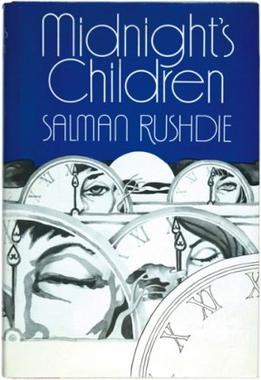
Midnight's Children is a 1981 novel by Indian-British writer Salman Rushdie, published by Jonathan Cape with cover design by Bill Botten, about India's transition from British colonial rule to independence and partition. It is a postcolonial, postmodern and magical realist story told by its chief protagonist, Saleem Sinai, set in the context of historical events. The style of preserving history with fictional accounts is self-reflexive.

The Satanic Verses is the fourth novel of British-Indian writer Salman Rushdie. First published in September 1988, the book was inspired by the life of the Islamic prophet Muhammad. As with his previous books, Rushdie used magical realism and relied on contemporary events and people to create his characters. The title refers to the Satanic Verses, a group of Quranic verses about three pagan Meccan goddesses: Allāt, Al-Uzza, and Manāt. The part of the story that deals with the "satanic verses" was based on accounts from the historians al-Waqidi and al-Tabari.

"Tryst with Destiny" was an English-language speech by Jawaharlal Nehru, the first Prime Minister of India, to the Indian Constituent Assembly in the Parliament House, on the eve of India's Independence, towards midnight on 14 August 1947. The speech spoke on the aspects that transcended Indian history. It is considered to be one of the greatest speeches of the 20th century and to be a landmark oration that captures the essence of the triumphant culmination of the Indian independence movement against British colonial rule in India. He declared the end of the colonial era and called on citizens to recognize the promise and opportunity of the moment:
"Long years ago, we made a tryst with destiny. Now the time has come when we shall redeem our pledge - not wholly or in full measure - but very substantially. At the stroke of the midnight hour, when the world sleeps, India will awake to life and freedom. A moment comes, but rarely in history, when we step out from the old to the new, when an age ends, and when the soul of a nation, long suppressed, finds utterance."

Shalimar the Clown is a 2005 novel by Salman Rushdie. The novel took Rushdie four years to write, and was initially published on 6 September 2005 by Jonathan Cape. Shalimar the Clown derives its name from Shalimar Gardens, in the vicinity of Srinagar. Srinagar is one of several Mughal Gardens, which were laid out in several parts of undivided India when the Mughals reigned over the subcontinent. Shalimar is also the name of one of the characters featured in the novel. Shalimar the Clown won the 2005 Vodafone Crossword Book Award and was one of the finalists for the 2005 Whitbread Book Awards.
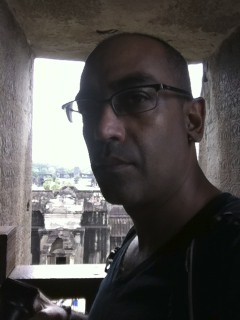
Siddhartha Deb is an Indian author.
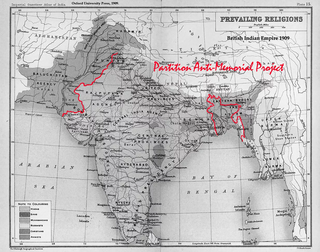
The Partition of India and the associated bloody riots inspired many creative minds in the republics of India, Pakistan, and Bangladesh to create literary/cinematic depictions of this event. While some creations depicted the massacres during the refugee migration, others concentrated on the aftermath of the partition in terms of difficulties faced by the refugees in both side of the border. Even now, more than 60 years after the partition, works of fiction and films are made that relate to the events of partition. W.H. Auden in his poem "Partition" showed the dilemmas of Cyril John Radcliffe, 1st Viscount Radcliffe, responsible for deciding which parts of India went where.

Grimus is a 1975 fantasy and science fiction novel by Salman Rushdie. It was his literary debut.

The Satanic Verses controversy, also known as the Rushdie Affair, was a controversy sparked by the 1988 publication of Salman Rushdie's novel The Satanic Verses. It centered on the novel's references to the Satanic Verses of the Quran, and came to include a larger debate about censorship and religious violence. It included numerous killings, attempted killings, and bombings by perpetrators who supported Islam.
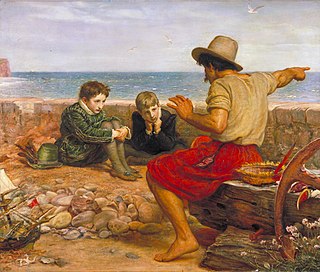
The Boyhood of Raleigh is an 1870 painting by John Everett Millais in the collection of the Tate Gallery. In the painting, Millais depicts famed Elizabethan-era explorer Walter Raleigh and his brother on the Devonshire coast listening to a Genoese sailor pointing out to sea and telling the pair of "tales of wonder on sea and land".
Sinai is a surname. It is a Portuguese-style spelling of the Konkani surname Shenoy or Shannai. This spelling originated from Goa on the West Coast of India. It is also an Arabic and Hebrew surname and masculine given name derived from Mount Sinai. In the United States, the 2010 Census found 367 people with the surname Sinai, making it the 55,841st-most-common name in the country. This represented an increase from 277 people in the 2000 Census. In both censuses, about eight-tenths of the bearers of this surname identified as white, one-tenth as Hispanic, and three percent as Asian. The Sinai families in India belong to the Brahmin caste.

Satya Sorab Bhabha is a British actor known for his role as Matthew Patel in the 2010 film Scott Pilgrim vs. the World and the 2023 animated series Scott Pilgrim Takes Off, and for his recurring role as Shivrang in the 2013 second season of New Girl.

Midnight's Children is a 2012 film adaptation of Salman Rushdie's 1981 novel of the same name. The film features an ensemble cast of Satya Bhabha, Shriya Saran, Siddharth, Ronit Roy, Anupam Kher, Shabana Azmi, Kulbhushan Kharbanda, Seema Biswas, Shahana Goswami, Samrat Chakrabarti, Rahul Bose, Soha Ali Khan, Anita Majumdar and Darsheel Safary. With a screenplay by Rushdie and directed by Deepa Mehta, the film began principal photography in Colombo, Sri Lanka, in February 2011 and wrapped in May 2011. Shooting was kept a secret as Mehta feared protests by Islamic fundamentalist groups.
Ashutosh Varshney is an Indian-born political scientist and academic. He is currently the Sol Goldman Professor of International Studies and the Social Sciences and Professor of Political Science at Brown University, where he also directs the Saxena Center for Contemporary South Asia at the Watson Institute for International and Public Affairs. Varshney previously taught at Harvard University and the University of Michigan.

The Tailor of Panama is a 1996 novel by British writer John le Carré. A 2001 film was released based on the novel.

Em and the Big Hoom is a 2012 English-language novel written by Jerry Pinto. The book won The Hindu Literary Prize, the Crossword Book Award, the Sahitya Akademi Award, and the Windham–Campbell Literature Prize.

Quichotte is a 2019 novel by Salman Rushdie. It is his fourteenth novel, published on 29 August 2019 by Jonathan Cape in the United Kingdom and Penguin Books India in India. It was published in the United States on 3 September 2019 by Random House. Inspired by Miguel de Cervantes's classic novel Don Quixote, Quichotte is a metafiction that tells the story of an addled Indian-American man who travels across America in pursuit of a celebrity television host with whom he has become obsessed.
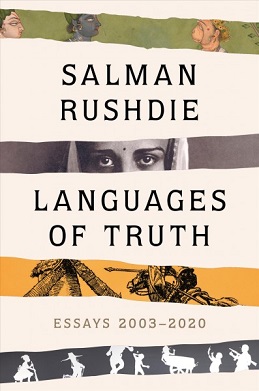
Languages of Truth is a collection of essays by Salman Rushdie. It was published in May 2021 by Random House.
References
- ↑ The Internet Public Library's Online Literary Criticism Collection Sites about Midnight's Children http://www.ipl.org/div/litcrit/bin/litcrit.out.pl?ti=mid-335
- 1 2 The Great Books Foundation: Midnight's Children
- 1 2 Sidhva, Shiraz (27 October 2002). "Handcuffed to History". The Hindu . Retrieved 10 September 2018.[ dead link ]
- ↑ Maximum City: Bombay Lost and Found Life lessons in a city of hope By Salil Tripathi "The Independent's Review of Maximum City by Suketu Mehta". Archived from the original on 5 February 2009. Retrieved 7 November 2008.
- ↑ Born again: Double parentage in Midnight's Children ""Born Again!"--Double Parentage in Midnight's Children". Archived from the original on 22 August 2002. Retrieved 7 November 2008.
- ↑ "Author Salman Rushdie says no more autobiographical characters". 11 February 2008. Archived from the original on 2 February 2017.
{{cite journal}}: Cite journal requires|journal=(help) - 1 2 Martyris, Nina (20 July 2008). "One more bouquet for Saleem Sinai". The Times of India.
- ↑ Rushdie, Salman (2006). Midnight's Children (25th anniversary ed.). London: Jonathan Cape. ISBN 022401823X.
- ↑ Inverne, James (5 January 2003). "Midnight Matinee". Archived from the original on 26 October 2012.
- ↑ "Handcuffed to History". The Hindu . 27 October 2002. Archived from the original on 30 June 2003.
- Rushdie, Salman (April 1981). Midnight's Children (1st ed.). London: Jonathan Cape. ISBN 022401823X.